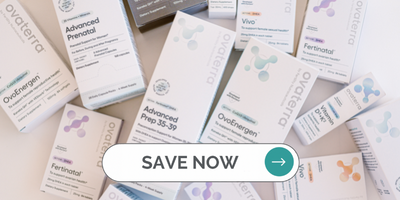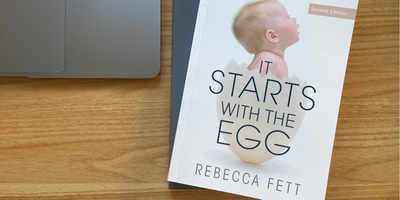If you and your partner are off birth control to try to get pregnant, you may have been wondering about fertility tests. Fertility tests can be a great option if you are having a challenging time getting pregnant. They can also be a good starting point to get a sense of where your reproductive health stands.
Let’s dig into what you need to know about fertility tests and how they work.
How exactly do fertility tests work?
Fertility tests can be done at home, at a doctor’s office or at a lab. As reproductive health involves many aspects, there are many fertility tests. When you have your fertility tests done at your doctor’s office, the process usually starts with a medical history, which gives your doctor the important context to assess the test results against.
A fertility test for a woman may include:
- Discussion with your healthcare provider about your medical history
- Discussion about your menstrual cycles and ovulation
- Hormone tests to check your hormone levels in the blood
- Ovarian reserve testing, also a blood test
- Physical exam and ultrasound
- Hysterosalpingogram (HSG), an x-ray of the uterus and fallopian tubes
For men, fertility tests typically revolve around sperm health. Semen analysis has been done at doctor’s offices for a long time, but there are also at-home sperm tests available now. Men’s fertility tests can include a physical exam, hormone tests (especially for testosterone) and genetic testing.
Who should consider fertility testing?
Fertility tests are recommended for women (and men) who have been trying for one year without a pregnancy. If you are 35 years of age or older, you may want to take a fertility test after six months of regular, unprotected intercourse without a pregnancy. This is because after age 35, women’s fertility decline can accelerate, making quick action more important.
For women, your doctor might recommend fertility testing if you have potential risk factors, such as:
- A history of multiple miscarriages
- Gynecological issues that affect your reproductive health, like endometriosis or fibroids
- Issues with your fallopian tubes, ovaries, or uterus
- Irregular or absent periods (amenorrhea)
- Problems with your thyroid function
- Sexually transmitted infections
- Have a male partner who has had a problem in semen analysis
What are common fertility tests on the market?
Some fertility tests check for the proper levels of reproductive hormones, while others look for hormonal changes associated with ovulation. Yet others evaluate your ovarian reserve (your ovaries’ ability to produce good-quality eggs).
Blood tests for reproductive hormones
For reproductive processes to work properly, reproductive hormones like FSH and estradiol must rise and fall at precise moments. Blood tests are done at different times in your menstrual cycle to see if the hormone levels are where they should be.
- Follicle-stimulating hormone (FSH) and anti-Müllerian hormone (AMH)
- Estradiol (E2)
- Inhibin B
- Progesterone
- Luteinizing hormone (LH)
- Testosterone, sex hormone-binding globulin (SHBG) and DHEA-s
Ultrasound screenings
An ultrasound can provide your doctor visual information about your ovaries, endometrial lining, and uterus. There are a few different types of ultrasound screenings:
- Baseline ultrasound: This ultrasound screening looks for anatomical abnormalities of your uterus.
- Follicular monitoring ultrasound: This fertility test, typically performed vaginally to monitor your progress during fertility treatments, tracks the growth of your ovarian follicles and thickness of your uterine lining.
- Saline sonograms: This type of ultrasound uses saline solution to assess the uterine cavity for abnormalities. It can also be used to test whether your fallopian tubes are open (i.e., the ovulated eggs can pass through the tubes to be fertilized, then implant in the uterus).
- Abdominal ultrasound: Abdominal ultrasound can be used to look further when transvaginal ultrasound doesn’t provide enough information to your doctor.
At-home fertility tests
Many of the reproductive hormones listed above are also available as at-home fertility tests. In addition, there are other fertility tests you can do at home - usually as a wellness test, rather than a clinical diagnostic test.
Because systemic health is the basis of your reproductive health, at-home tests that are not specific to reproductive health can have reproductive health impact. For example, both hA1C tests to measure blood sugar levels and thyroid hormone tests to gauge thyroid function can help you on the TTC journey.
Fertility-specific home tests include:
- Vaginal microbiome test
- Sperm tests
- Ovulation tests and fertility trackers
Can fertility tests tell when I’m fertile?
You might not think of ovulation trackers as belonging to fertility tests, but they do. In each menstrual cycle, women have a small window of opportunity to get pregnant. This peak fertility period, called the fertile window, usually lasts 3-5 days. Ovulation tests and fertility monitors can help you identify this fertile window, so that you can time your intercourse to your peak fertility.
Ovulation trackers use several different methods to identify the fertile window. Some use basal body temperature (or BBT), while others use cervical mucus or reproductive hormones like luteinizing hormone (LH) and progesterone. Ovulation trackers can also pick up signs when there may be problems with ovulation. (Here's our guide to choosing an ovulation tracker that works for you.)
What are the benefits of taking a fertility test?
Fertility tests - whether done at home or at the doctor’s office - can be a useful tool when you run into a roadblock on your journey to parenthood. They can identify the potential issues so you and your doctor can address them to achieve a healthy pregnancy.
How long should couples wait before seeing a doctor?
Fertility struggles are more common than many people think, affecting 1 in 6 to 7 couples. American College of Obstetricians and Gynecologists recommends:
- For women younger than 35 to consult a doctor when they don’t get pregnant after a year of consistent trying; and
- For women over 35 to consult a doctor after 6 months of trying.
Ways to help support reproductive health
Beside doctor’s help, a few things are already in your toolbox to support your reproductive health on your own. If you haven’t, our first recommendation is to read “It Starts With Egg,” written by Rebecca Fett to get actionable insight into supporting egg health. Knowing when your fertile window is, maintaining a healthy weight, ensuring you are getting all the key prenatal nutrients and enough high-quality sleep all play a role on your journey.
Monitoring your menstrual cycle
Tracking your menstrual cycles is important for understanding your ovulation and fertile window. Ovulation trackers can help you learn when you ovulate in your cycle and which days you will be most fertile. Being informed about your own body via period tracking and ovulation tracking can also help you have a productive conversation with your doctor when you go in for fertility testing.
Building your nutritional foundation
Many of the key nutrients during pregnancy have been suggested to support the preconception period as well. While most of the nutrients are present in the food you eat, it can be difficult to get enough every day. Taking high-quality prenatal vitamins can help you reach the recommended daily intake.
The Centers for Disease Control and Prevention recommends the following daily amounts, while optimal amounts may be higher.
- Folate (Folic Acid): 400 mcg
- Choline: 450 mg during pregnancy; 550 mg when nursing
- Iodine: 220 mcg while pregnant; 290 mcg when nursing
- Iron: 27 mg
- Vitamin A: 770 mcg while pregnant; 1,300 mcg when nursing
- Vitamin C: 85 mg while pregnant; 120 mg when nursing
- Vitamin D: 600 IU (or 15 mcg)
- Vitamin E: 15 mg while pregnant; 19 mg when nursing
- Vitamin K: 90 mcg
- Calcium: 1,000 mg
- Vitamin B12: 2.6 mcg while pregnant; 2.8 mcg when nursing
- Vitamin B6: 1.9 mg while pregnant; 2.0 mg when nursing
Healthcare providers recommend that women take prenatal vitamins as soon as they plan on getting pregnant - because women don’t know they are pregnant during the crucial early weeks of pregnancy. Some of the nutrients’ daily requirements go up even higher when you are nursing, in order to support the health of both you and the baby.
Quitting smoking and reducing alcohol intake
While it is never considered healthy, you especially want to avoid smoking when trying to get pregnant. Study after study have shown smoking’s negative effects on pregnancy chances - let alone the risk of congenital abnormalities. The evidence on alcohol and fertility is somewhat more mixed, but studies do agree that excessive drinking is detrimental during the preconception period. (Of course, once you are pregnant, doctors recommend no alcohol.)
Getting enough rest
Sleep and reproductive processes share the same endocrine processes, and studies have shown that getting enough high-quality sleep is beneficial for your fertility. Sleep trackers like the Wesper At-Home Sleep Test can help you track and improve the quality of your sleep to ultimately support your reproductive health.
Prioritizing stress management
Stress negatively impacts fertility. (It also shares the same endocrine processes with sleep and reproduction.) While eliminating stress completely is not possible, managing your stress levels well can help support you on the journey. You probably know what works best for you, but going for a walk in a natural environment, doing yoga, reading a book or watching an engaging show and talking to someone you trust or a therapist can all be a way to effectively manage stress.
Takeaway
There are many ways to understand your reproductive health with fertility tests. You can take at-home tests, but the best way forward may be to work with your doctor - or a fertility specialist- to interpret the results of physical exams, x-rays, blood tests and ultrasounds and rule out any abnormalities that can hold you back.
Please reach out if we can answer any questions about how best to use fertility tests to propel your journey. We are with you.










